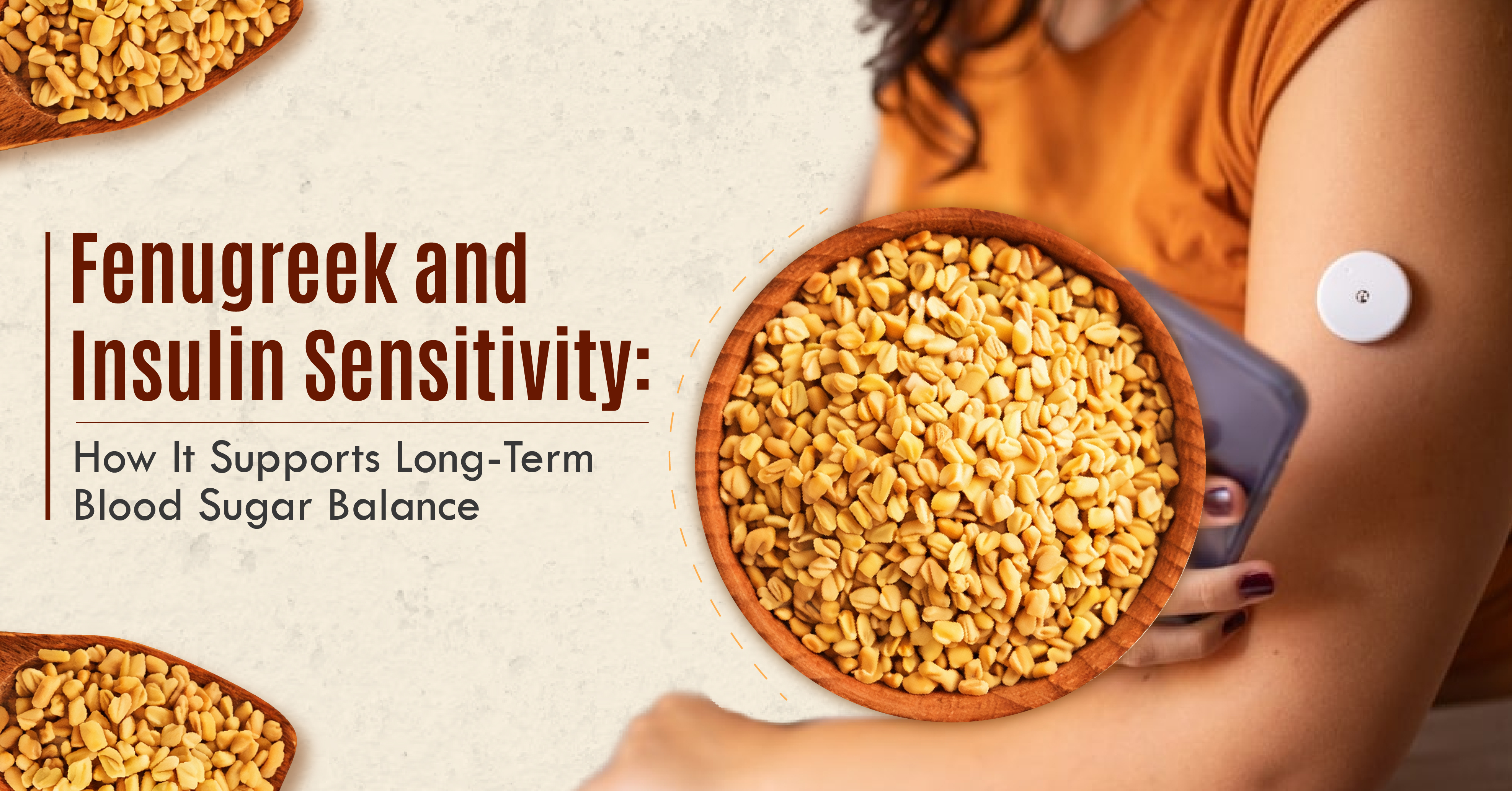Fenugreek and Blood Pressure: Managing Hypertension Alongside Diabetes
11 Nov, 2025

Introduction
Living with diabetes often means managing more than just blood sugar levels. High blood pressure, or hypertension, is a common companion to diabetes, increasing the risk of heart disease, stroke, and other complications. Controlling both conditions is essential for overall health and quality of life.
Nature offers effective ways to support this dual challenge. One such natural remedy is fenugreek, a seed long used in traditional medicine. Fenugreek not only helps control blood sugar but also offers significant benefits in managing blood pressure.
This blog delves into how fenugreek works, why it's valuable for people with diabetes and hypertension, and practical ways to include it for better health.
The Connection Between Diabetes and High Blood Pressure
Diabetes and hypertension often occur together because they share common risk factors such as obesity, poor diet, and sedentary lifestyle. Both conditions damage blood vessels and increase stress on the heart, raising the risk of cardiovascular diseases.
High blood pressure in diabetics can worsen kidney problems, nerve damage, and eye diseases, making blood pressure control critical.
How Fenugreek Supports Blood Sugar Control
Fenugreek seeds are rich in fiber, antioxidants, and active compounds like trigonelline and 4-hydroxyisoleucine that help:
- Slow down carbohydrate digestion and absorption
- Stimulate insulin secretion and improve sensitivity
- Reduce insulin resistance
- Lower blood glucose levels in both type 1 and type 2 diabetes
These effects help improve blood sugar control naturally, reducing the burden on the pancreas and other organs.
Fenugreek's Role in Reducing Blood Pressure
Several studies demonstrate that fenugreek seeds can also help lower high blood pressure through various mechanisms:
- Blood Vessel Relaxation: Fenugreek contains compounds that help relax and dilate blood vessels, reducing the resistance blood faces as it flows through arteries, which lowers blood pressure.
- Diuretic Effect: It acts as a mild diuretic, promoting the removal of excess salt and water from the body, easing pressure on blood vessels and lowering blood volume.
- Antioxidant Action: Chronic high blood pressure is linked to oxidative stress that damages blood vessels. Fenugreek's antioxidants neutralize free radicals and protect vessels from harm.
- Anti-inflammatory Benefits: Inflammation contributes to hypertension; fenugreek's anti-inflammatory properties help soothe the vascular system.
Scientific Evidence Supporting Fenugreek for Hypertension and Diabetes
Research studies provide encouraging evidence:
- A study involving prediabetic and diabetic participants showed fenugreek powder reduced fasting blood sugar and significantly lowered systolic and diastolic blood pressure over months of supplementation.
- Participants also experienced improved lipid profiles, with lower bad cholesterol (LDL) and higher good cholesterol (HDL), decreasing cardiovascular risk.
- Fenugreek's high fiber content slows sugar absorption and also aids in cholesterol reduction, making it a heart-healthy choice for diabetics.
- Safety evaluations confirm fenugreek is well-tolerated, with minor side effects like mild gastrointestinal discomfort in some individuals.
How to Include Fenugreek in Your Routine
Incorporating fenugreek into your diet or supplement plan can be simple:
- Fenugreek Seeds: Soak 1-2 teaspoons of whole seeds overnight and eat them in the morning or add them to salads and soups.
- Fenugreek Powder: Use fenugreek seed powder in cooking or mix it with water to drink daily.
- Supplements: Fenugreek extracts like tablets or capsules offer concentrated forms suitable for easy daily use. Always consult your healthcare provider before starting supplements.
- Fenugreek Tea: Brew fenugreek seeds for a natural infusion to enjoy multiple health benefits.
Lifestyle Tips to Complement Fenugreek's Benefits
Fenugreek works best as part of an overall healthy lifestyle:
- Maintain a balanced diet that focuses on whole foods, low salt, and rich in fruits and vegetables.
- Get regular physical activity to improve cardiovascular health and insulin sensitivity.
- Limit alcohol consumption and avoid tobacco products.
- Manage stress through relaxation techniques like meditation or yoga.
- Keep regular check-ups to monitor blood pressure, blood sugar, and overall health.
Precautions and Considerations
While fenugreek is natural, it can interact with medications like blood thinners, diabetes drugs, or blood pressure pills. Always seek medical advice before adding fenugreek supplements to your routine.
Pregnant or breastfeeding women should also consult healthcare professionals as fenugreek has hormonal effects.
Conclusion
Fenugreek stands out as a versatile natural remedy that supports controlling both blood sugar and blood pressure, key health concerns for people living with diabetes. Its fiber, antioxidants, and active compounds promote heart health and better metabolic balance, helping reduce risks of complications.
Incorporating fenugreek seeds, powder, or supplements into a healthy lifestyle offers a safe and effective way to manage hypertension alongside diabetes. Always discuss with your healthcare provider to ensure the best approach tailored to your individual needs.
By taking natural steps with fenugreek and mindful lifestyle choices, you can take control of your health and enjoy a better quality of life.




